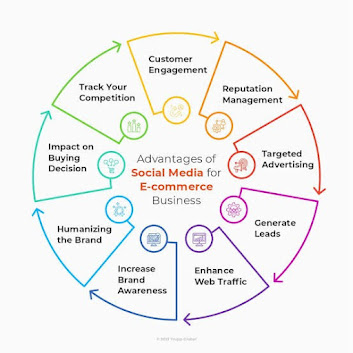A Strategic Guide to Implementing Social Media Marketing in E-Commerce
In the ever-evolving world of e-commerce, social media has emerged as
a powerful tool for businesses to connect with their audience, build brand
awareness, and drive sales. With billions of active users across platforms,
social media marketing offers unparalleled opportunities for e-commerce
businesses to grow. However, a well-thought-out strategy is essential to
harness its full potential. This guide explores how to effectively implement
social media marketing in e-commerce, focusing on the role of Social Media
Optimization, and highlights how OSK IT Solutions and other providers of digital
marketing services in Nagpur can help.
The Importance of Social Media in E-Commerce
Social media platforms are where your target audience spends a
significant amount of time. Whether it’s scrolling through Instagram, pinning
ideas on Pinterest, or engaging with brands on Facebook, these platforms are
instrumental in shaping consumer purchasing decisions. Social media marketing
not only increases visibility but also allows businesses to foster genuine
relationships with their audience.
Key Benefits of Social Media Marketing for E-Commerce
Enhanced Brand Visibility
With social media, businesses can showcase their products and services
to a broader audience. Platforms like Instagram and TikTok are particularly
effective for visually appealing e-commerce brands.
Targeted Advertising
Social media platforms offer advanced targeting tools, enabling businesses
to reach specific demographics based on interests, behaviors, and geographic
locations.
Increased Website Traffic
Strategic use of Social Media Optimization can direct traffic to your
e-commerce website, improving chances of conversion.
Higher Engagement Rates
Engaging content on social media can boost interactions, creating a
loyal customer base and increasing sales.
Cost-Effective Marketing
Compared to traditional advertising, social media marketing is
relatively inexpensive, making it ideal for businesses of all sizes.
Steps to Implement a Successful Social Media Marketing Strategy
1. Define Your Goals
Before diving into social media marketing, it’s essential to outline
clear objectives. Common goals for e-commerce businesses include:
·
Driving website traffic
·
Increasing sales
·
Building brand awareness
·
Improving customer engagement
By defining your goals, you can tailor your strategy and measure its
effectiveness more accurately.
2. Understand Your Target Audience
Knowing your audience is the cornerstone of a successful social media
strategy. Identify your ideal customer’s:
·
Age, gender, and location
·
Preferences and shopping behaviors
·
Preferred social media platforms
This understanding will help you create content that resonates and
drives action.
3. Choose the Right Platforms
·
Not all social media platforms are created
equal. Each platform serves a different purpose and audience. For example:
·
Instagram and Pinterest are excellent for
visually-driven products.
·
Facebook offers diverse advertising options for
a broad audience.
·
LinkedIn is ideal for B2B e-commerce businesses.
·
TikTok targets younger audiences with short,
engaging videos.
Select platforms that align with your target audience and business
goals.
4. Create Engaging Content
Content is king in social media marketing. The types of content that
work well for e-commerce include:
·
Product images and videos: High-quality visuals
showcasing your products.
·
User-generated content: Customer reviews,
photos, or videos featuring your products.
·
Stories and live streams: Behind-the-scenes
content or live Q&A sessions.
·
Informative posts: Tutorials or tips related to
your products.
Partnering with experts like OSK IT Solutions, who offer digital
marketing services in Nagpur, can help in crafting creative and optimized
content.
5. Optimize with Social Media Optimization
Social Media Optimization (SMO) focuses on enhancing your social media
presence to drive engagement and conversions. SMO strategies for e-commerce
include:
·
Using relevant keywords and hashtags to improve
visibility.
·
Optimizing your profiles with consistent
branding and links to your website.
·
Scheduling posts at optimal times for maximum
reach.
·
Encouraging shares and interactions to increase
organic reach.
Professional agencies like OSK IT Solutions specialize in SMO
to help businesses stand out in the crowded social media landscape.
6. Leverage Paid Advertising
Organic reach on social media is limited, but paid advertising can
amplify your efforts. Platforms like Facebook, Instagram, and LinkedIn offer
robust ad tools that allow you to:
·
Retarget website visitors.
·
Showcase products to lookalike audiences.
·
Promote time-sensitive offers.
With the right investment, paid ads can significantly boost your
e-commerce sales.
7. Engage with Your Audience
Social media is a two-way street. Active engagement fosters trust and
builds relationships. Here’s how:
·
Respond to comments and messages promptly.
·
Address customer concerns professionally.
·
Run polls, quizzes, and contests to encourage
interaction.
·
Acknowledge and share user-generated content.
Engagement not only strengthens customer loyalty but also enhances
your brand image.
8. Monitor Analytics and Adjust
Social media marketing is an ongoing process. Use analytics tools to
monitor the performance of your campaigns. Metrics to track include:
·
Engagement rates
·
Website traffic
·
Conversion rates
·
Follower growth
Analyzing these metrics helps identify what works and what doesn’t,
enabling you to refine your strategy for better results.
How OSK IT Solutions Can Help
Comprehensive Social Media Optimization to enhance your brand’s
online presence.
·
Targeted ad campaigns to drive traffic and
conversions.
·
Creative content creation and management for
various platforms.
·
In-depth analytics to measure performance and
ROI.
By partnering with OSK IT
Solutions, e-commerce businesses can focus on their core operations while
professionals handle their social media marketing needs.
Common Challenges in Social Media Marketing for E-Commerce
While social media marketing offers immense potential, businesses may
encounter challenges such as:
Maintaining Consistency
Regular posting and interaction require time and effort. Partnering
with a professional agency can help maintain a consistent presence.
Ad Fatigue
Overloading your audience with ads can reduce engagement. Balance
promotional content with value-driven posts.
Changing Algorithms
Social media platforms frequently update their algorithms, affecting visibility.
Staying updated and adjusting strategies is crucial.






Comments
Post a Comment